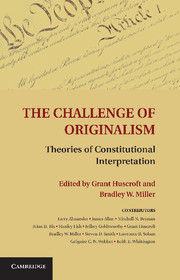The Challenge of Originalism: Theories of Constitutional Interpretation
Published online by Cambridge University Press: 07 October 2011
Summary
Originalism is a force to be reckoned with in American constitutional theory. From its origins as a monolithic theory of constitutional interpretation, originalism has developed into a sophisticated family of theories about how to interpret and reason with a constitution. Contemporary originalists have harnessed the resources of linguistic, moral, and political philosophy in responding to critics. Recent work is characterized by methodological concerns about how to identify the meaning of constitutional texts as well as the development of normative arguments for fidelity to them.
Despite these developments, originalism is sometimes dismissed out of hand. Critics of originalism often rely on stock arguments that neither add-ressed nor anticipated the arguments of contemporary originalists. Many are persuaded that originalism was dealt a fatal blow by the criticism of Paul Brest and Jefferson Powell in the 1980s, culminating in the failure of Judge Robert Bork's nomination to the United States Supreme Court. But originalism has moved on considerably since that time. The multiplicity and complexity of the new variants of originalism require interlocutors to make a considerable investment in order to participate in the debate. The essays in this volume, which includes contributions from the flag bearers of several competing schools of constitutional interpretation, provide an introduction to the development of originalist thought, showcase the great range of contemporary originalist constitutional scholarship, and situate competing schools of thought in dialogue with each other. They also make new contributions to the methodological and normative disputes between originalists and non-originalists, and among originalists themselves.
- Type
- Chapter
- Information
- The Challenge of OriginalismTheories of Constitutional Interpretation, pp. 1 - 11Publisher: Cambridge University PressPrint publication year: 2011



